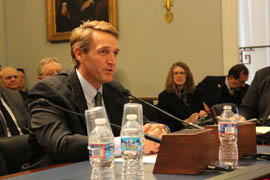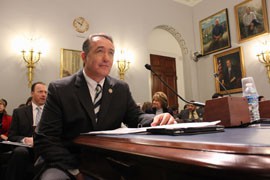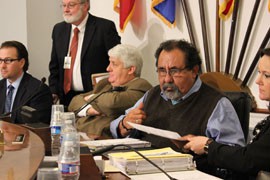Cronkite News has moved to a new home at cronkitenews.azpbs.org. Use this site to search archives from 2011 to May 2015. You can search the new site for current stories.
Committee hears bills by Flake, Franks to open public lands to shooting
WASHINGTON – Federal officials are eyeing shooting restrictions on more than a million acres of public land, half of which are in Arizona, said Rep. Jeff Flake, R-Mesa, who wants to block the restrictions.
Flake’s measure was one of two Arizona shooting bills – along with Rep. Trent Frank’s proposal to transfer 315 acres of federal land in Mohave County to the state for use as a shooting range – taken up Tuesday by a House Natural Resources subcommittee.
The National Rifle Association testified in support of both bills, saying their passage is important to protecting the Second Amendment.
“You have to be able to exercise your rights,” said Susan Recce, NRA director of conservation, wildlife and natural resources. “If you don’t have places where you can practice your right, then it is a limited right.”
Recce said the Bureau of Land Management’s actions show a bias against recreational shooting, a claim that BLM officials at the hearing denied.
“The bureau provides more extensive shooting opportunities than any other agencies,” said Bob Ratcliffe, the bureau’s deputy assistant director of renewable resources and planning. He said the BLM has 240 million acres of land open to recreational shooting, an area equal to Arizona, California and Nevada combined.
Flake’s bill, HR 3440, would limit BLM’s ability to close national monuments to recreational shooting to six months. The bill has 30 cosponsors, including Franks, R-Glendale, and Arizona Reps. Paul Gosar, R-Flagstaff, and David Schweikert, R-Scottsdale.
Franks’ bill, HR 919, would transfer 315 acres in the Mohave Valley from BLM to the Arizona Game and Fish Commission for it to use as a public range.
The BLM said Flake’s bill would tie the agency’s hands, making it harder to issue timely responses to “unforeseen circumstances” such as wildfires, and that it might give local stakeholders less say in decisions to close lands to recreational shooting.
“This legislation would protect recreational shooting above all other recreational uses and put both resources and public safety at risk,” Ratcliffe said.
Rep. Raul Grijalva, D-Tucson, and a member of the House Subcommittee on National Parks, Forest and Public Lands that heard the bills, asked why Flake’s bill would take decision-making power away from BLM managers and put it in the hands of officials in Washington.
“I can’t count the number of times I’ve heard from my colleagues … praise the wisdom of local land managers and celebrate all local involvement in land management decisions,” Grijalva said. “Now we have a bill to centralize that decision making in Washington, D.C.”
Ratcliffe said BLM supports the goal of Franks’ bill “but opposes the legislation as currently drafted.” He said the bill needs to address tribal issues and protect valid existing rights, as well as add a clause that would return the land to the BLM if it is not used properly.
But Franks said the bill is needed to provide space for local police, hunters and other recreational shooters to sharpen their skills away from the general public.
“Arizona’s Mohave County has experienced rapid growth over the last few years, and traditional locations for target shooting are now too close to populated areas for safety,” he said.
Franks said a shooting range on Mohave County public land has been under consideration for more than 13 years, and this bill would finally “get shovels on the ground.”
“There is a need to designate a centralized, multipurpose shooting range in location in Mohave County to promote safe hunting and shooting practices,” he said.









